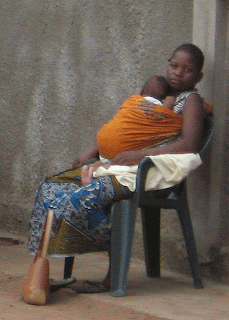
I have finally finished all my interview work (for now). I return to Madjadjane on Wednesday to give a presentation on my research - purpose, preliminary results, and photos of the community.

Catharanthus roseusThis last week of interviews was really difficult. I am burnt out on interviews, much of the interview was devoted to saying good-bye (for now), and I was physically exhausted. Many people that I didn't interview, but passed on the road or passed by their homes, stopped me for a chat and said that they will really miss me. I will really miss them too.
Madjadjane, and Gala, are the type of communities that just don't seem to exist in the United States anymore. People make jokes about "it takes a village to raise a child" but this really happens. So does
Ubunto, and knowing all your neighbors, and sharing what you have even if it isn't much, and pooling resources to get a bigger project accomplished.

One of my good friends, Sr. Mateus (who loves to talk) told me this week that he was glad I came and stayed, and hopes that I can return soon. But besides that, he told me that my questions about how people and culture and landscape are tied together opened many people's minds. He felt pride in where he came from and his community. That made me feel good - like I had accomplished something tangible and useful.

So what does this have to do with prejudice? During the interviews this past week I spent a significant amount of time asking about plant identification and use. Over the past 9 months I took photos of plants people mentioned during interviews and plants that caught my eye or were common in the community. A couple of the plants were very pretty flowers (photos in this blog). During the interview, people mentioned how beautiful these flowers were. They might not know the names, but they all said that people planted these flowers in their yards to make their homes beautiful.
I was surprised that people would plant flowers to make their homes beautiful. These flowers have no other utility for most people (specialists did mention that one species could be used as a medicine). I had assumed that residents didn't have the time or the space to plant anything around their home that had no utility as a food or a medicine. Or that they would even care about making their homes beautiful. They do talk about different trees being beautiful, but most trees around homes were already growing when the homes were built. Also, these trees usually provide fruits, medicines, or construction materials.
When I realized the depth of the assumption I had made, I felt horrible. Why wouldn't poor people/African farmers care about making their homes beautiful? Why wouldn't they see beauty in their surroundings? Why should brancos corner the market on landscaping?

I think that my prejudice stems from the fact that the landscaping in cities like Maputo, Pretoria, and other African cities I've visited is modeled on a Western ideal. The people I see landscaping are low level workers, usually black. I never thought that they might take an interest in the work other than that it was a job that paid the bills. I also think that some of my horror in the discovery comes from my own research and reactions to Westerners who describe agriculture in southern Mozambique as messy, wasteful, and inefficient. I always answer that multi-cropping milho (maize), squash, bean, and peanut helps keep soil fertility and conserves biodiversity. And all those "weeds" are medicines or wild foods.
The African landscape is different in many respects from an American or European landscape. I find the African landscape very beautiful, but at the African household scale I still carried some baggage. I'm glad that my mind was opened, and I was forced to rethink my point of view.

I would identify the plants in this blog, unfortunately I have already mailed home all my plant identification guides. I'll post the species if anyone is interested when I return to the States.





















































